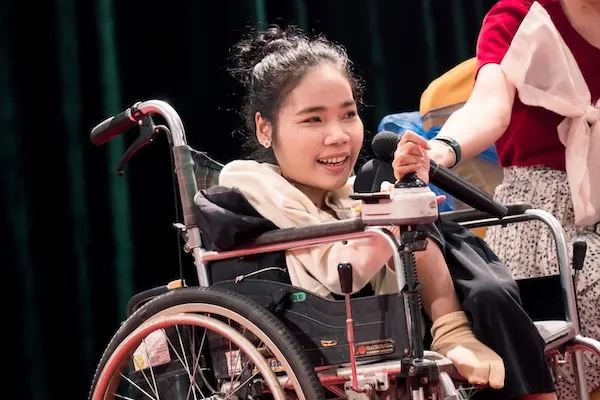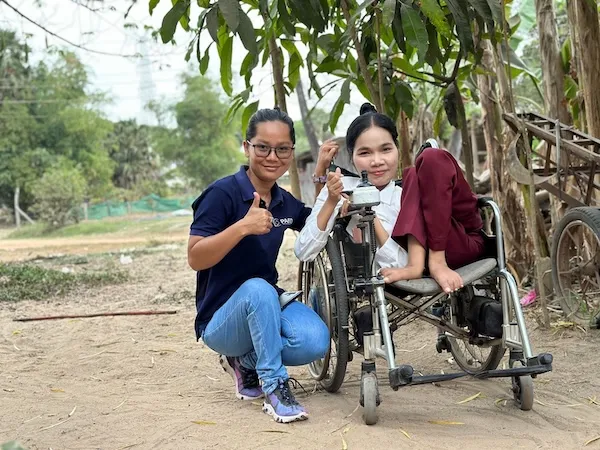Ms. Preap Voleak is from a rural commune in Siem Reap province and is one of seven siblings. Due to limited support and personal challenges, she left school in Grade 6. For many years, she remained at home, rarely going outside and relying on others for daily needs. She felt uncomfortable about her appearance and was often hesitant to engage with others due to the way people looked at her. During this time, she faced feelings of isolation and low self-esteem, which made daily life very difficult.

“What made me the most excited was that the WWDs as participants mentioned that I was the first woman with severe disability taking lead and provide training to others. This really inspired them to participate and actively support each other to not being shy and shut people out”
She also found a strong sense of belonging within the WWD Network, which she describes as her second family. This experience gave her renewed hope and confidence, encouraging her to dream again and to inspire other women to become active participants in their communities.
Motivated by this transformation, she stepped out of her comfort zone and developed a small project proposal. Her aim was to form a self-help group (SHG) for women with disabilities and provide training on mental health care, GBV, the rights of persons with disabilities, and to build the capacity of local authorities on disability rights and inclusive services.
Eventually, Ms. Preap Voleak applied for and was interviewed by the program manager of the LFTW Women with Disabilities (WWD) program. She was selected to join the WWD Network.
Through the program, she gained knowledge and skills in :
- Leadership,
- Advocacy,
- Project proposal writing and management,
- Sexual and reproductive health (SRH),
- Gender-based violence (GBV),
- Mental health care, and
- Disability inclusion.
However, implementing the project was not without challenges. The local authorities, including the commune chief, did not initially approve her project. She faced doubts about her ability to lead the initiative and was not granted permission to move forward at first.
“I couldn’t provide any information or approve the project at first because I had only been staying at home, not working. I didn’t believe I was capable of carrying out a project like this.”
To move her project forward, Voleak was advised to obtain a supporting letter from LFTW (now known as PAfID) confirming her membership in the Women with Disabilities (WWD) Network. She submitted the letter, but the district office requested additional documents, including PAfID’s registration papers with relevant ministries, which would need to be submitted at the provincial level. Unfortunately, due to time constraints, this was not feasible.
Despite these setbacks, Voleak continued to advocate for her project. She returned to the district office multiple times, facing rejection three times. On her fourth visit, she brought all the necessary documents and explained her project in detail. The officer then advised her to obtain an official letter of approval from the commune chief. Determined, Voleak returned to the commune office with a formal request. After reviewing her documents and recognizing her commitment, the commune officer approved the project, allowing her to begin implementation.
Although the process was challenging, Voleak gained valuable experience and confidence. Through her project, she conducted meetings and training sessions for local authorities on the rights of persons with disabilities, access to GBV support services, and mental health care. She also introduced the concepts of disability inclusion and accessibility, and advocated for improvements at the commune office to make it more accessible to all.
In addition, she successfully formed a self-help group (SHG) for women with disabilities, where members received training on disability rights, GBV and legal support, and mental health care. The group was created to strengthen the voices of women with disabilities and encourage their active participation in community life.
Voleak expressed deep happiness and pride in what she had achieved. She shared that this was the first time in her life she felt truly confident, and that the project not only improved her self-esteem but also changed how her community perceived her.
“I was so delighted; I was almost in tears when I heard the authority called me a teacher as well as WWDs in the group that I worked with them in this project. It was my first time in life; I could not believe that now in my community, I was considered as a teacher. I was even more delighted when the authority said that my project was the first project that focus on women with disability in my community. They learnt (local authority and WWDs group) a lot new skills about disability inclusion and the law — things we had never heard about before.”
